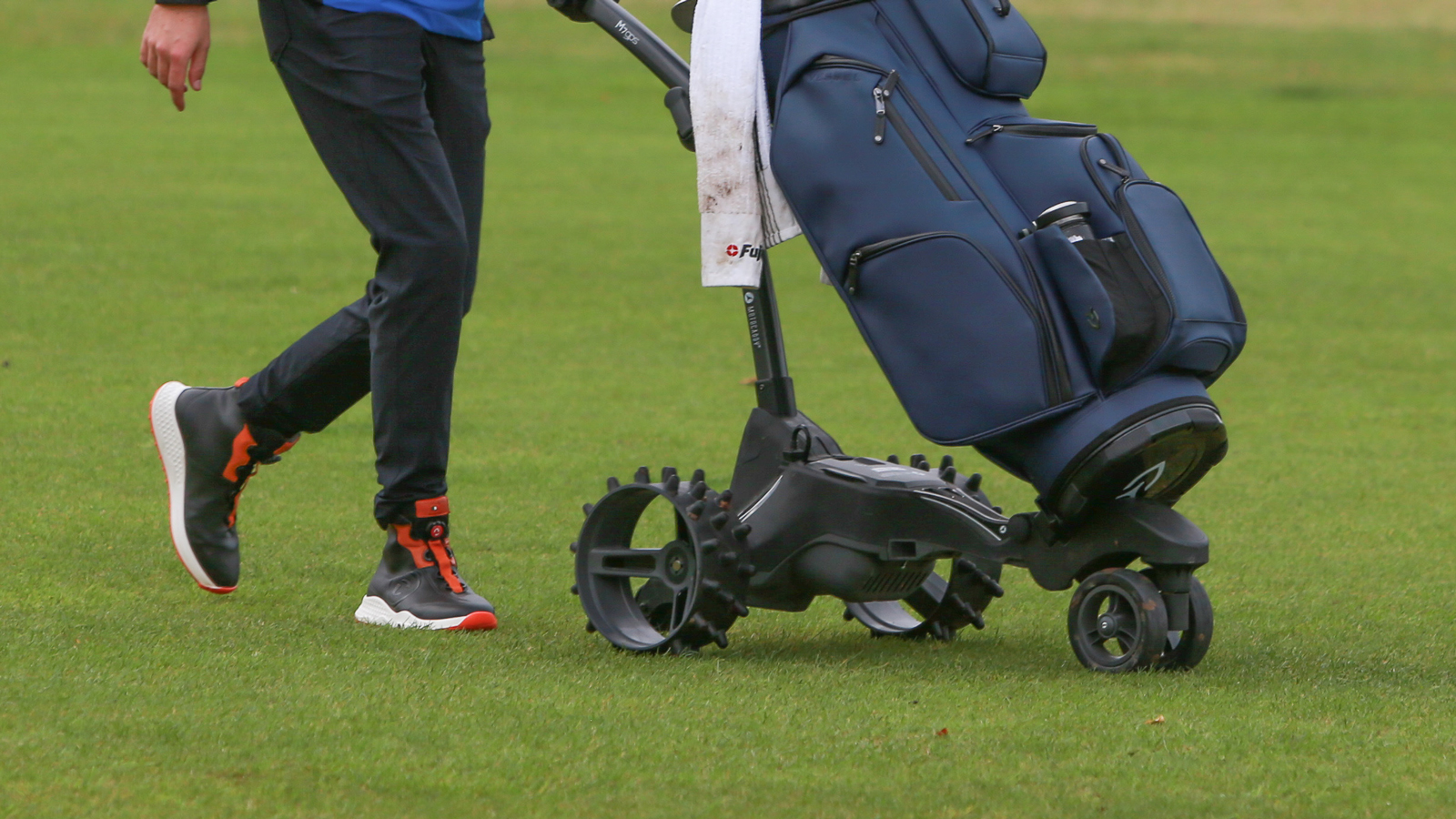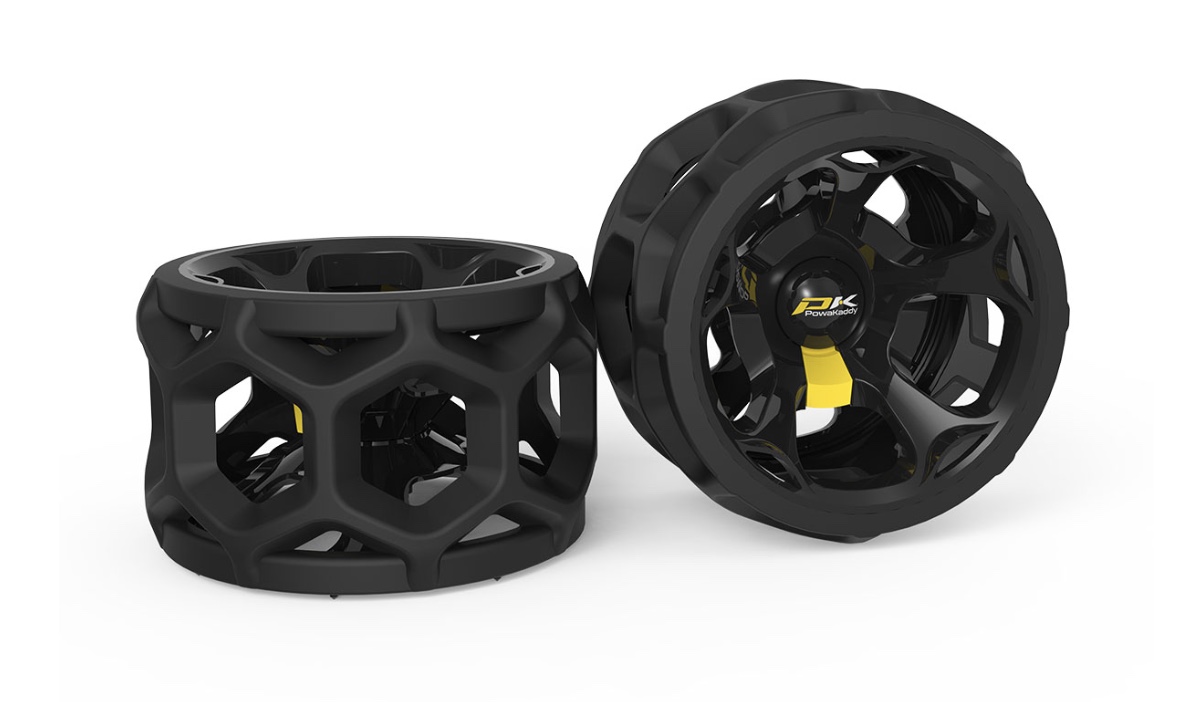
'Tis the season - winter wheels season to be precise. Depending on the type of golf course you play on, studded winter wheels on electric trolleys and push carts will likely be heavily enforced. My home course insists on the use of winter wheels, something I'm all for, but I have often wondered what they actually do to help preserve the integrity of the course versus traditional trolley wheels. Some online forums have even suggested the accessories are a total fallacy and do more harm than good - so I had to do some digging for myself to find out.
Firstly, how many golf courses actually enforce winter wheels or ban trolleys when the weather gets wet? Our friends at the British and International Golf Greenkeepers Association (BIGGA) presented a poll on its X (formerly Twitter) account asking 'When the weather gets bad do you, ban trolleys entirely, switch to winter wheels, or allow trolleys on courses regardless?' The responses showed a near three-way split across the three answers.
@GolfMonthly are asking greenkeepers for their thoughts on trolleys and winter wheels. When the weather gets bad do you:December 4, 2023
Somewhat surprisingly, 42.7% of greenkeepers said they will ban trolleys entirely when the weather gets bad enough. Does this suggest that, to these respondents, winter wheels still won't suffice in protecting the golf course in the dampest of conditions? Just over 30% said they make sure to enforce a winter wheel policy while 26.6% let trolleys on golf courses regardless of the weather conditions. I'd suspect many of these courses are links courses that don't suffer as much in very wet weather. Still, it was interesting to see that only 30% of courses actually require winter wheel use.
What is the principal behind winter wheels?
Let's look at how flat trolley wheels damage wet and muddy grass. When the ground is particularly moist, flat wheels will begin to compact and flatten the soil, eventually killing the grass that sits on top of it. Let's not forget about frosty conditions too. Flat wheels in these conditions will bunch the grass together, causing it to burn and eventually die off over the rest of the winter. You can imagine how torn-up popular walkways on golf courses would be if everyone had flat-wheeled electric trolleys. Damaged grassroots, muddy trails, compacted turf and skid marks should be the least of greenkeepers' worries as they work on the course over the winter.
Of course, not everyone can carry their clubs and, for some, an electric trolley is the only option when it comes to playing golf. Rightly, golf courses want to keep the courses accessible to as many of its members as possible, and so winter wheels are something of a compromise between player and club. It's worth remembering that using winter wheels has benefits to the user too, not just the golf course. Wet and muddy ground will often see flat wheels spinning and falling back down hills. Winter wheels will give much more traction and make walking the course with your trolley that bit easier.

One of the more unqiue winter wheel designs was introduced back in 2009 when BIGGA worked alongside electric trolley manufacturer PowaKaddy to create the hexagonal winter wheels pictured above. The wheels went through a detailed eight-step testing process to simulate how trolleys are used on real golf courses in wet conditions.
The wheel's key performance attributes include better weight distribution, an open tread system that allows for minimal overall ground contact, and minimal ground penetration. For sure, these wheels didn't eliminate all traces of electric trolleys on the golf course, but it was significantly reduced. The 'hedgehog' wheels are more commonly seen on other electric and push trolleys and are developed on the same principles as PowaKaddy wheels. They reduce contact with the soil by up to 85% while the 'studs' part the grass rather than compact it, with only a small dimple in the turf evidence of a trolley having passed through.
With both main styles of winter wheels, it's all about creating less damage to the course and allowing it to recover quicker than if a flat-wheeled trolley had gone through the area. The research conducted, to me, proves that while not the perfect solution, winter wheels certainly protect the ground more than flat trolley wheels and allow golf courses to recover quicker from heavy traffic.
Do Winter Wheels On Golf Trolleys Actually Protect The Course?
In short, yes but they're not the perfect solution. My opinion on the matter has always been this - trust and listen to your golf club. If your greenkeepers want every trolley to have winter wheels, they are certainly in a better position than you or me to make that decision. As we saw from the poll, over 70% of greenkeepers will take some sort of measure to minimize the damage that trolleys cause to the course, by either banning them outright or enforcing winter wheels to minimize damage.
If you can, try and carry your clubs to eliminate as much ground wear as possible, but if you can't winter wheels are the next best thing. To help with protected wet grass, my course adopts fairway mats during the winter - something I'm all for. Avoiding heavy traffic areas in your trolley is also good advice when the ground is wet, and is something I'm sure greenkeepers will be very grateful for.
Golf in the depths of winter is never about playing well or striking the ball to your best ability. It's mostly about getting outside when the weather allows and enjoying what little daylight there is. Protecting courses so they're in the best condition possible in the summer is something everyone should be working together to achieve and using winter wheels is one of these little gestures that make a big difference if everyone buys into it.







